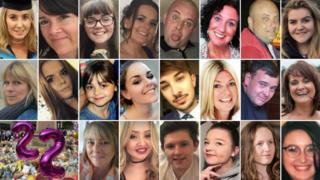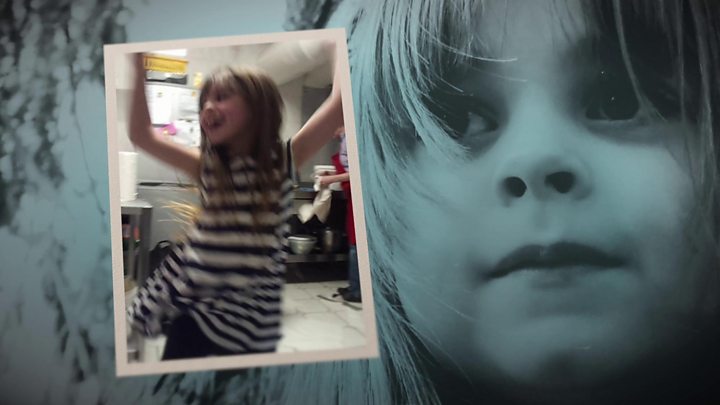 Image copyright
Family handouts
Image copyright
Family handouts
The public inquiry into the Manchester Arena terror attack "will leave no stone unturned", the lead counsel says.
Proceedings are now under way at Manchester Magistrates' Court, less than a mile from where the bombing happened on 22 May 2017.
The hearing began with Paul Greaney QC, counsel to the inquiry, reading the names of the 22 people who died.
"What happened that night was the most devastating terrorist attack in the UK for many years," he said.
"The inquiry will leave no stone unturned."
'Establishing the truth'
Families, lawyers and chairman of the inquiry Sir John Saunders, a retired High Court judge, stood with heads bowed for a minute's silence before Mr Greaney's opening.
Sir John then formally opened the inquiry, adding "this is an exercise in establishing the truth".

"If I conclude things went wrong then I shall say so, but we are not looking for scapegoats. We are searching for the truth," he said.
"The explosion killed 22 people, including children, the youngest was eight years old.
"Salman Abedi blew himself up in the explosion but he intended as many people as possible would die with him."
Sir John added that some evidence must be heard in secret to prevent similar terrorist attacks.
The hearing comes more than three years after Salman Abedi set off a bomb at the end of an Ariana Grande concert, killing himself and 22 others.
Following a trial, a jury found Hashem Abedi guilty of helping his older sibling to plan the atrocity that left hundreds more injured.
He was jailed for at least 55 years on 20 August for the 22 murders.
In his opening statement, Mr Greaney told the inquiry "experts consider that on 22 May there were missed opportunities to identify Salman Abedi as a threat and take mitigating action".
While there is evidence that suspicions were raised by members of the public in the minutes before the attack, "no steward or British Transport Police (BTP) officer appear to have identified him as suspicious", the inquiry heard.
One member of the public, William Drysdale, spotted Salman Abedi wearing a large backpack and thought he was praying, less than an hour before he detonated his bomb.
A second witness with Mr Drysdale then approached a BTP officer but the officer cannot recall the conversation, the hearing was told.
Two more witnesses, known only as A and B, also saw a man matching Salman Abedi's description acting suspiciously.
Mr A spoke to a Mohammed Agha, an employee of Showsec, the firm which provided security to the arena on behalf of the venue's owners, SMG.
Mr A spoke to Mr Agha at 22.14, some 17 minutes before the detonation.
Mr Agha then spoke to a colleague, Kyle Lawler, about the matter, eight minutes before the bomb went off.
But neither security control, nor anyone else, was informed about the suspicious activity, the hearing was told.
Mr Greaney said whether there were "missed opportunities" to prevent the attack or reduce its deadly impact would be a key consideration for the public inquiry.
Mr Greaney also said expert evidence would be heard about risk assessments at the arena.
"There was no effective risk assessments that considered the threats from terrorism at Manchester Arena in early 2017, despite the severe threat level," he said.
The chairman will make a report and recommendations once all the evidence has been heard by the inquiry, which is expected to take up to six months.
Why not follow BBC North West on Facebook, Twitter and Instagram? You can also send story ideas to northwest.newsonline@bbc.co.uk